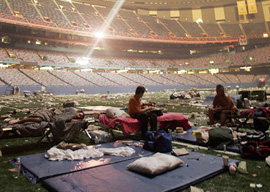
January 27, 2012

Instead of “Take Me Out to the Ball Game,” Florida’s homeless population may soon be singing “Put Me Up at the Ballpark.”
Florida Senate Bill 816 unanimously passed a preliminary committee vote on Monday and now must leap through three more procedural hula hoops before it reaches the Senate floor. If it and a similar Florida House bill pass, the owners of the Sunshine State’s pro sports teams would be required to pay back an estimated $271 million in public funds they’ve received if they fail to prove that they’ve used their facilities as homeless shelters on days when they weren’t being used for contracted sporting and entertainment events.
Come again?
As freaky-deaky as it sounds, the bill is based on an actual passage in a Florida statute that was passed in 1988 and called for precisely such an oddball arrangement—in order for team owners to receive public funding to erect their glimmeringly gaudy athletic palaces, now-deceased Democratic Senator Jack Gordon had insisted on a stipulation where sporting arenas were required to be used for housing the homeless—or the indigent, or the disenfranchised, or the unsheltered, or street persons, or bums, or whatever you prefer to call them—on days when there were no Jacksonville Jaguars games or Miami Sound Machine concerts.
News reports have referred to it as “a long-forgotten law,” an “old statute” that opportunistic lawmakers recently “dug up,” “a dormant 1988 law,” “a little-known state law,” and something that was “Tucked away deep in the annals of Florida law.” The way they talk, one would think you needed a rusty old crypt key to find it. Truth is, it’s been there in the public record since 1988 for anyone who bothered to read it.
It’s simply never been enforced. And apparently none of Florida’s team owners, nor the multiple out-of-state owners who still receive public funds for using Florida ballparks during spring training, have ever obeyed it.
Not that it’d be easy to obey. The 1988 statute obviously didn’t consider logistics. What do you do when the local team has an extended home stand? Herd the stadium’s part-time occupants into buses and dump ’em back on Skid Row until the team goes on the road again? And exactly how homeless does one have to be to score the luxury suites?
Some are now alarmed that there’ll be bums in the bleachers and derelicts in the dugouts and that knife-wielding, crack-puffing ne’er-do-wells will be stinking up the skyboxes. They warn that conditions would quickly devolve into a bloody Katrina-level Superdome rapefest. Others cheer that the state is finally doing something to more adequately serve Florida’s homeless population, which is estimated at anywhere from 50,000 to 90,000—in other words, far more people than usually attend a Marlins home game.
Back when Mickey Mantle was swatting home runs and Bart Starr was throwing touchdown passes, major-league sporting arenas tended to be privately funded.